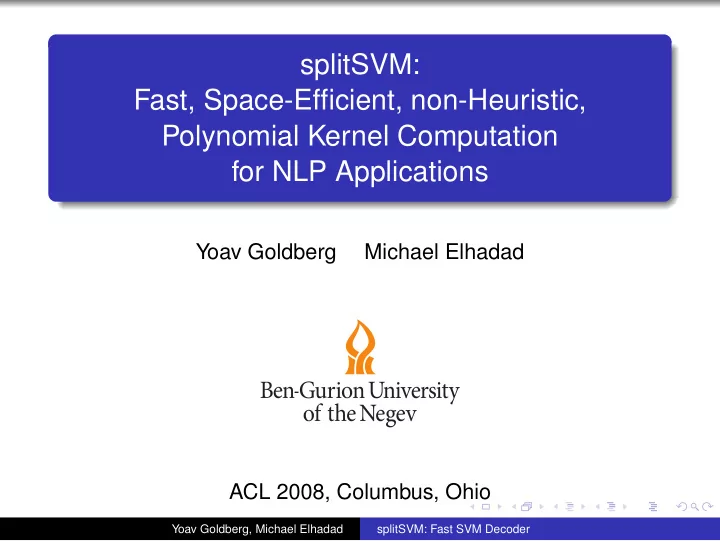

splitSVM: Fast, Space-Efficient, non-Heuristic, Polynomial Kernel Computation for NLP Applications Yoav Goldberg Michael Elhadad university-logo ACL 2008, Columbus, Ohio Yoav Goldberg, Michael Elhadad splitSVM: Fast SVM Decoder
Introduction Support Vector Machines SVMs are supervised binary classifiers Max-margin linear classification Can perform non-linear classification by use of a kernel function SVMs in NLP SVM classifiers are used in many NLP applications Such applications usually involve a great number of binary valued features Using d th-order polynomial kernel amounts to effectively consider all d -tuples of features Low-degree (2-3) Polynomial Kernels constantly produce university-logo state-of-the-art results Yoav Goldberg, Michael Elhadad splitSVM: Fast SVM Decoder
The Problem Kernel-SVMs are slow! Computation of kernel-based classifier decision is expensive! Can grow linearly with size of training data. Non-kernel classifiers are orders of magnitude faster. We are not talking about learning, we are talking about the decision for a given model. Enter splitSVM We propose a method for speeding up the computation of low-degree polynomial kernel classifiers for NLP applications, while still computing the exact decision function, and with a modest memory overhead university-logo Yoav Goldberg, Michael Elhadad splitSVM: Fast SVM Decoder
Kernel Decision Function Computation �� � y ( x ) = sgn x j ∈ SV y j α j K ( x j , x ) + b In every classification, A Set of Support Vectors . the kernel function must be computed for Each support vector is a each Support Vector weighted instance from the training set. There typically are many such vectors. university-logo Yoav Goldberg, Michael Elhadad splitSVM: Fast SVM Decoder
Decision Function Computation - Polynomial Kernel �� � x j ∈ SV y j α j ( γ x · x j + c ) d + b y ( x ) = sgn The polynomial kernel of degree d Proportional to the number of d -tuples of features the classified item and the sv have in common. university-logo Yoav Goldberg, Michael Elhadad splitSVM: Fast SVM Decoder
Polynomial Kernel Speedup 1 �� � x j ∈ SV y j α j ( γ x · x j + c ) d + b y ( x ) = sgn Speedup method 1 – PKI (Kudo and Matsumoto 2003) Feature vectors are sparse If the classified item and an sv don’t share any features, we can skip the kernel computation for this sv ⇒ Keep an inverted index of feature → sv , and use it to find only the relevant sv s for each item Problem: the Zipfian distribution of language Language data has a Zipfian distribution ⇒ There is a small number of very frequent features W:’a’ , POS:NN , POS:VB university-logo ⇒ PKI pruning does not remove many sv s . . . Yoav Goldberg, Michael Elhadad splitSVM: Fast SVM Decoder
Polynomial Kernel Speedup 2 y ( x ) = sgn ( w · x d + b ) Speedup method 2 – Kernel Expansion (Isozaki and Kazawa, 2002) ⇒ transform the d -degree polynomial classifier into a linear one in the kernel space At classification time: transform the instance to be classified into the d -tuple space, and perform linear classification (each weight in w corresponds to a specific d − tuple ) Problem: the Zipfian distribution of language Language data has a Zipfian distribution ⇒ There is a huge number of very in frequent features W:calculation , W:polynomial , W:ACL ⇒ The number of d -tuples is Huge! university-logo Storing w is impractical Yoav Goldberg, Michael Elhadad splitSVM: Fast SVM Decoder
Our Solution: splitSVM This work: splitSVM Features have Zipfian distribution ⇒ Split the features into rare and common features Perform PKI inverted indexing on the rare features Perform Kernel Expansion on the common features Combine the result into a single decision For the math, see the paper university-logo Yoav Goldberg, Michael Elhadad splitSVM: Fast SVM Decoder
Software Toolkit Java Software Available We provide a Java implementation: splitSVM We provide the same interface as common SVM packages (libsvm, yamcha) In order to use splitSVM in your application: Train a libsvm/ svm light /tinySVM/yamcha model as you did before Convert the model to our splitSVM format Change 2 lines in your code university-logo Yoav Goldberg, Michael Elhadad splitSVM: Fast SVM Decoder
A Testcase - Speeding up MaltParser MaltParser (Nivre et.al., , 2006) A state of the art dependency parser Java implementation is freely available Uses 2nd degree polynomial kernel for classification Uses libsvm as classification engine . . . is a bit slow. . . Enter splitSVM We use the pre-trained English models We replaced the libsvm classifier with splitSVM (Rare features: those in less than 0.5% of the SV s) university-logo Yoav Goldberg, Michael Elhadad splitSVM: Fast SVM Decoder
A Testcase - Speeding up MaltParser Method Mem. Parsing Time Sents/Sec Libsvm 240MB 2166 (sec) 1.73 ThisPaper 750MB 70 (sec) 53 Table: Parsing Time for WSJ Sections 23-24 (3762 sentences), on Pentium M, 1.73GHz Only 3 fold memory increase ∼ 30 times faster A Java-based parser parsing > 50 sentences / sec! university-logo Yoav Goldberg, Michael Elhadad splitSVM: Fast SVM Decoder
To Conclude Simple idea. Works great. Simple to use. Use it. http://www.cs.bgu.ac.il/ ∼ nlpproj/splitsvm university-logo Yoav Goldberg, Michael Elhadad splitSVM: Fast SVM Decoder
Recommend
More recommend